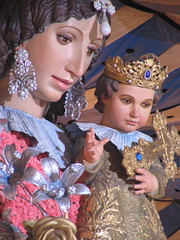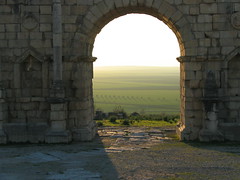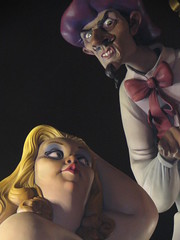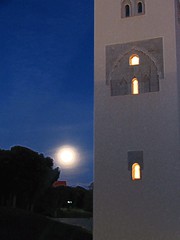I meet him in Fez. He prefers a little cafe inside the medina. He teaches Arabic Literature and film in Rabat. We talk about the Koran. I ask him about words and phrases, about the difference between haddiths. Occasionally, we talk about broad questions: what does the Koran really say about revenge? kings, women, ghosts?
"God said that if you need witnesses for a trial, you must have two men or one man and two women. Why? Because God understood that women during that time of the month of their menstrations sometimes act a little odd. They forget. If you have two, one can remind the other."
I tell my friend there are women in Berkeley who would behead him if they heard that.
We talk about one of Mohammed's disciples, Awas Ibn Malik, whose teaching, my friend says, is the basis of the Sunni faith in Morocco. "Why? He's the easiest." Compared to say, Wahhabists, who believe that you absolutely must not pray unless you have used water to cleanse yourself. But ibn Malik was a pragmatist. For him, you can simply find a rock, not any rock, not a volcanic rock or one with holes, but a smooth stone and you put it in a corner of your house — not unlike the meteorite in the Kabaa but my friend tells me this is a coincidence, not symbolic — and you rub the stone and then rub your face and hands and the simulation is enough.
Invariably, the conversation returns to the disparity between rich and poor in Morocco. This is the real topic. The Koran is warm-up, two laps around the field. He shakes his head at the way the teachers are treated in local schools. They strike twice a week in Ifrane he tells me. They get low salaries, they're rarely paid on time; no resources for their classrooms. And who is to blame, the rich ministers and members of the assembly. Look at what they're paid; their retirement packages....
"And did you ever wonder what happened to the hospital?"
There is a brand new hospital on the edge of town, once fully equipped. It was supposed to be the seed of a medical school, but never opened. One story is that the university couldn't find enough doctors to come live in Ifrane.
"Do you believe that?" my friend asks.
I don't know what to believe anymore.
Under his smile, his deep faith, my friend seethes. Above all, he resents the rich students he must deal with at the university in Rabat. His patience is tested when he hears how the poor are treated these days.... This is the door to the most sensitive subject of all.
Once, I asked him about the royal linneage, the tie to Mohammed. He took out a piece of paper and wrote Mohammed's name. He drew several lines to suggest a family tree. Under some, he wrote, 'son'. Under others, 'daughter'. Then he crossed out each of the three sons.
"All died," he said. "No heirs. We know that."
He likes to draw diagrams.
Then, he asked me my name. He can never remember it. I told him. He wrote it down as he had written Mohammed. He wanted my children's names. I told him. "And your sons, when they have children what will be their name." Mine, I said. He was nodding all the time. "And when your daughter has children what name will they carry?" I hesitated. "Will they carry your daughter's name?" he asked. " No, I suppose not."
"Exactly," he said. Then, like a math teacher, he tapped both trees with his pen. "You see?"
There is no link, no tie, no line. "It's all a fabrication. No one who knows about Islam believes that. It's for the people, but it's not true."
"You see," he went on, "the only link, the only tie through the Koran, could be through 'good works'." And above his diagram he wrote "work" and underlined it twice. "Good works is the only possible link, " he said, leaning forward because he believes there are spies and informants everywhere and that the people are getting fed up to here again.
Mar 22, 2005
Mar 19, 2005
Rustica's Magdalene
Two broads on the wall.
— "Who's the stiff?" I asked.
— "Mags," said the 'tender.
— "She don't look so good."
— "She passed."
— "Still..."
— "Each to his own," he said
and chucked me another.
— "She looks used," I said.
Not like I remember."
— "Whataya expect? She was used."
— "Still.
Mic towled some tumblers.
— "Who was her last?
That's what I want to know."
Mic shook his head.
— "I like the angel better anyway,"
he said.
— "Classly lookin' broad,
good figure," I said.
— "She comes in here from to time.
After hours."
— "Yea?" I said. "I'll wait."
— "Who's the stiff?" I asked.
— "Mags," said the 'tender.
— "She don't look so good."
— "She passed."
— "Still..."
— "Each to his own," he said
and chucked me another.
— "She looks used," I said.
Not like I remember."
— "Whataya expect? She was used."
— "Still.
Mic towled some tumblers.
— "Who was her last?
That's what I want to know."
Mic shook his head.
— "I like the angel better anyway,"
he said.
— "Classly lookin' broad,
good figure," I said.
— "She comes in here from to time.
After hours."
— "Yea?" I said. "I'll wait."
Mar 18, 2005
Mar 14, 2005
Dialogue With Stone
"I had a dream".
Stone didn't reply. She was just happy to be pushed.
"In it I wrote a play, which was not well received by my agent."
So, said Stone. So.
"All I can remember from the dream was the line, 'You can't beat the 20th Century'."
You can't beat it for what, said Stone.
"That's it, I don't know."
Well, why think about it then?
"I'd like to know if there's some message there."
Maybe, you spent enough time beating up the past. Or beating around that bush.
We went on up in silence.
"Do you enjoy being pushed," I asked.
You always ask me that.
"Wouldn't you rather be immovable? After all, that's part of your nature."
But then where would you be?
"Back in Corinth".
Being devious and a trickster? No, you're better here.
And just at that moment we reached the top and I let her go even before I had to and watched her roll down until she was absolutely still.
Mar 13, 2005
On the way to the Falles Festival
Malaga’s odd squalor, condic splendor for slavo tanners,
In the name of sol. Of old and cold. Ravenous for a light.
Bus neighs and quivers, swerves away, north-by-heaven,
To Granada, beyond the coastal range, Allah’s Allah:
Covered in olive oil and trees; corn-rowed hills like heads,
All dead asleep. The land’s labaisse. Labaisse? Hamdullah!
‘While the rest of Europe’: sewerless, lightless, or books,
Flea-bitten, and gray. Rat rich in gothy, goric clamor,
Meanwhile, far above. Al Hambra’s carved white verses,
Curving in the still, of faithfully protractered pools,
The water-master's geometric haven, but always sad...
Never quite Babylon, or Mecca, is it? Fez or goat enough,
Tent enough, Berber strong and warm enough...
Over the pass. My mind is at a run, contemplating El Rio
Guardalmedina; Hannibal’s retreat; the lasting insult
of unremembered dreams; two breasts vibrating,
a student's, rearranging credit cards; my father, forever
shaving in the nude, those bent blue eyes, under the shade
of martini glasses, and eucalyptus, on North Cordoba Drive,
Sounds of pirate masts, reaching, in sargosso’s still —
save for a witch’s crow.
Bus puts shoulders to the road, head swinging under a load.
And suddenly there it is, out of somewhere, baby paradise,
just as it would have been, in 732, spitting images of Atlas,
white caps over old Marakkech, but less rocks here, less
curse, more oranges in the air. But now. Disolve. Latter day,
Rolling through the gates of the city: under car-topped pillars;
Faschisti-taggers and signs of whizi-goths outside the clubs.
Ibn Khaldun's clock strikes twelve... Bus snorts — spooked:
that same scent of shephard's despair... Now where's home?
and the new Almovids whirling in the dust, disoriented,
unfounded. No, this is not a sweet Seville and never was....
Mar 12, 2005
Half faced
The grail’s somber bell strikes 10.
For a blue boy’s Arthur at any age.
We pause at Plaza de la Reina,
St Martin’s all agony, half-faced,
Our traveler backs to the wall,
Go this way, that way, another way.
All dons know their sacred way.
But in the moment all looks lost;
windmill can’t turn, horse won’t budge.
Mar 7, 2005
Truth & Reconciliation
He was from the Truth and Reconciliation Committee: Abdelhay Moudden, a big shouldered man and the academic director at the Center for Cross Cultural Learning in Rabat. He gave a lecture at the university, followed by questions. The biggest question is how the truth — the whole truth about Hassan's II's treachery, what he knew and when he knew it, which may never be known, considering the chaotic and inaccessible state of the national archives — how the truth will affect people's notion of the monarchy? Will this open the door to more democracy or more fundamentalism? Or the military who, you'll remember, staged 3 coup d'etats.
But it was the very last anecdote that caught the ear. He explained that last week he and some of the commissioners had spoken at a school near where the commission meets. At the school he met three 13-year-old girls who asked him about his work: what was he doing? What was this commission looking into? Why? He had never thought of the problem posed by having to explain this kind of work to children. What a fool he had been and suddenly he had a revelation, which was that, of course, this would all have to be explained to people for whom politics is never mentioned. The girls had all seen the commission hearings on TV. What do you remember about it? he asked. Well, they said, they remembered a few individual stories: the one about the man who was arrested while riding on his bicycle and another about a woman weeping for her lost son. He asked them, what do you think we are doing? He knew they had some idea. Just tell me, he said, what comes to mind. They shook their heads. Anything at all, he said, any idea that comes to mind. They shook their heads. And that's when it occurred to him that even having no direct experience in the violations, which may still be going on, they knew instinctively, reflexively that that this was not a subject to know anything about. Politics, he said, is taboo and we are still living in a place and a time when this subject is associated with pain. An association, an NGO, is looking into this matter of how to talk to children; it's called Mountada al Moutana, in Rabat.
Subscribe to:
Posts (Atom)





